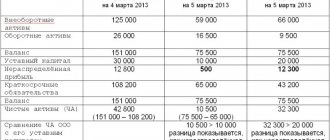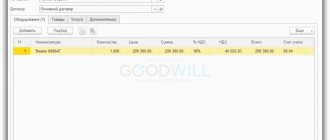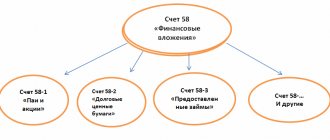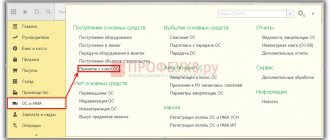Many multi-storey buildings today are maintained and operated by management companies, which must provide high-quality utilities and carry out cosmetic and major repairs. Accounting in a management company is carried out with specific features, which will be discussed below.
How to conduct accounting in a management company
Accounting entries in the housing and communal services management company often concern only two actions:
- Purchasing resources from supply companies.
- Sale of resources to residents of houses.
In the first action, accountants form accounts payable and expenses of the management company, in the second - accounts receivable and profit. Therefore, it is better to conduct accounting in housing and communal services in the following way - create an accounting policy. This refers to the nuances of accounting for assets and liabilities, profits and losses. The more correctly and accurately the accounting entries are drawn up, the more elementary the work of accountants will be. Why this is needed is clear, but what it should include in a little more detail. This is an accounting of the following transactions:
- settlements with companies providing resources;
- consumption of materials;
- settlements with tenants-buyers of utilities;
- income and expenses;
- performers' salaries;
- tax calculations;
- settlements under other counterparty agreements.
All the basic provisions that help to correctly conduct the accounting policy in the housing and communal services management company regarding expenses and income are in the Accounting Regulations 1/2008. In addition to accounting, the management company also maintains tax accounting in public utilities, the policy of which complies with the criteria of the Tax Code of Russia.
The chart of accounts is necessary directly for accounting, therefore such activities are approached with full responsibility. The work plan is created on the basis of a legislative act of the Ministry of Finance. It is necessary to enter into the plan only accounts that are actually used by the management company. And, for example, postings related to animals and other similar ones should not be included.
In many cases, management companies use a unified form for accounting purposes, which is approved by Goskomstat. But since 2013 it may not be used. In any situation, management companies approve their forms in their accounting policies. Samples can be found for free on the Internet.
The accounting policy, chart of accounts and accounting forms must be drawn up in one order, which is signed by the management of the management company and the chief accountant. Such an act should be rewritten every year, since laws change and accounting policies become outdated.
The accounting records of enterprises must be maintained without interruption, regularly, all actions are reflected in the postings, which will be discussed below, and in primary documents. Accountants must prepare reports in accordance with the required standard, which is written in the Federal Law “On Accounting”. In addition, statistics are also calculated. The accounting policy processes described above are mandatory in the accounting department of the management company.
OKVED in the housing and communal services sector
Any management company conducts its activities with the aim of making a profit. In this regard, all companies are required to undergo appropriate registration and receive a code from the All-Russian Classifier.
This code is assigned so that the tax authorities are aware of what activities a particular organization is engaged in. Legal entities do not have the right to start their activities without receiving a code. The following codes are relevant for the Criminal Code:
These figures indicate that the company carries out activities related to real estate management, accounting and inventory.
To summarize, we note that maintaining accounting records in a management company is not difficult if a competent, educated and experienced specialist does it. The main thing that needs to be done is to correctly formulate an accounting policy, decide on the taxation system and know the basic transactions. An up-to-date chart of accounts should always be at the accountant’s workplace. You should also keep up to date with ongoing accounting updates. As a rule, changes occur quite often.
By following these rules, you will prevent problems with maintaining accounting and tax records in management companies, as well as difficulties with the tax authorities.
If you find an error, please select a piece of text and press Ctrl+Enter.
Didn't find the answer to your question? Find out how to solve exactly your problem - call right now:
+7 (Moscow) +7 (St. Petersburg)
As you know, providing the population with public services, repairs and maintenance of housing stock is a troublesome and very expensive task. In this regard, it is quite understandable that management companies, created, as a rule, on the basis of former housing and communal services and housing complexes, want to apply a simplified taxation system that allows them to legally minimize tax liabilities. Our experience in tax consulting shows that management companies should pay special attention to the specific tax consequences of transactions they enter into in the interests of citizens.
Its main objectives are to ensure favorable and safe living conditions for citizens, proper maintenance of common property in an apartment building, resolving issues regarding the use of said property, as well as providing utilities to citizens living in an apartment building (Part 1 of Article 161 of the RF Housing Code).
The Housing Code of the Russian Federation provides for three forms of management of an apartment building (Part 2 of Article 161 of the Housing Code of the Russian Federation): directly by citizens, a homeowners' association (another specialized consumer cooperative) and a management company. The first two of these methods are beyond the scope of this study, so we will only consider legal relations that arise within the framework of management with the involvement of the Managing Organization.
In fact, housing legislation contains three cases when an apartment building can be managed by a management organization:
Part 1 of Article 162 of the Housing Code of the Russian Federation stipulates that a management agreement must be concluded in writing with each owner of premises in an apartment building.
As a general rule, the specific terms of the management agreement are determined by the general meeting of owners. However, if such a meeting does not approve such conditions, or the management agreement is concluded on the basis of a notification from the local government body (Part 4 of Article 161 of the RF Housing Code), the latter approves the form of the management agreement by its decision.
The subject of the management agreement is that the Customers undertake to pay, and the Management Organization undertakes to provide services and perform work on the proper maintenance and repair of common property in the house, provide utilities, and carry out other activities aimed at achieving the goals of the Management.
Thus, the management agreement, by its legal nature, is a mixed agreement with elements of contracting and paid services. This conclusion is confirmed by paragraph 3 of the Rules for the provision of utility services to citizens, which defines the contractor (which may be the Managing Organization) as a legal entity (individual entrepreneur) providing utility services, producing or purchasing utility resources and being responsible for servicing in-house engineering systems, with the use of which utility services are provided to the consumer.
In general, the activities of the Management Organization can be divided into two main components.
1. PROVISION OF PUBLIC SERVICES.
Thus, if the Managing Organization does not have its own facilities for the production of utility resources, it enters into a purchase and sale agreement with the resource supplying organization.
Obviously, with such a scheme for formalizing contractual relations (due to the requirements of the current legislation), it is impossible to say that the Management Company, in relations with the resource supply organization, performs the functions of an agent performing the task of the owners of residential premises.
Consequently, resource supply organizations are responsible for the proper fulfillment of the terms of the contract only to the Management Company.
In turn, the Management Company, in relations with citizens, cannot refer to a violation of the terms of the contract by the resource supplying organization.
If we consider the tax consequences of this type of activity, it should be noted that the revenue of the Management Organization must consist of all amounts received from residents, since they are income from sales (Article 249 of the Tax Code of the Russian Federation).
Particular attention should be paid to the fact that fees for utilities do not include remuneration to the Management Company (Article 154 of the Housing Code of the Russian Federation). In practice, this means that the acquisition of utility resources and the provision of utility services to citizens is carried out at one tariff approved in accordance with the established procedure (clause 15 of the Rules for the provision of utility services to citizens), that is, after settlements with the resource supplying organization, the Management Company does not have any profit, its income for tax purposes is equal to expenses.
2. MAINTENANCE, CURRENT AND OVERHAUL REPAIRS OF COMMON PROPERTY IN THE HOUSE.
The content of this type of activity is regulated by the Rules for the maintenance of common property in an apartment building, which determine the composition of common property and the requirements for its maintenance, as well as a list of types of work that do not relate to the maintenance of common property.
The management company may have the necessary capacity and labor resources to carry out maintenance and routine repairs on its own. At the same time, it may involve third parties to perform the specified work, unless a prohibition on this is established by the management agreement.
The type of activity under consideration contains both elements of a contract (current and major repairs) and paid services (maintenance of property). In this regard, relations related to the involvement of third parties are regulated by the rules on the general contractor and subcontractor.
In accordance with Article 154 of the Housing Code of the Russian Federation, fees for the maintenance and repair of residential premises include, among other things, fees for services and work on managing an apartment building. As a general rule, the amount of payment for the maintenance and repair of common property is determined by the general meeting of owners. However, in the case where the owners have not made a decision on choosing a management method, the amount of such fees is approved by local government bodies.
The specificity of this type of activity of the Management organization is that the owners pay for current and major repairs here and now, but in fact these works will be performed in the future, that is, the Management company accumulates these funds in its accounts until the general meeting of owners makes a decision on the need for repairs.
Of course, the question immediately arises: how should the Management Company determine its revenue?
Regarding the payment for housing maintenance, everything is clear: it is taken into account as part of the income from sales, since these services are provided in the current period. As for funds for repairs, they are also income from sales, but their accounting for tax purposes depends on the method used by the Management Company for determining income.
If the Management Organization applies a general taxation system and determines income on an accrual basis, it has the opportunity to classify funds for major repairs as deferred income in the form of advance payment for work and, on the basis of subparagraph 1 of paragraph 1 of Article 251 of the Tax Code of the Russian Federation, not to take them into account when forming the taxable base .
If the Managing Organization determines income using the cash method, the amount of payment for repairs must be taken into account by it in the period when they actually arrived at the cash desk (clause 2 of Article 273 of the Tax Code of the Russian Federation). The possibility of attributing these amounts to expenses is associated with the moment of actual completion and payment of repair work (clause 3 of Article 273 of the Tax Code of the Russian Federation).
Management companies using the simplified taxation system must keep similar records. Since, by virtue of paragraph 1 of Article 346.17 of the Tax Code of the Russian Federation, the date of receipt of income is the day of receipt of funds at the cash desk (cash method), payments for housing repairs should be taken into account in the period of its actual receipt from residents.
It seems that payment for repairs cannot be recognized as property received within the framework of targeted financing, since the list of cases of such financing given in subparagraph 14 of paragraph 1 of Article 251 of the Tax Code of the Russian Federation is closed and is not subject to broad interpretation.
The Ministry of Finance of the Russian Federation comes to a similar conclusion, considering in a letter dated June 26, 2006 No. 03-11-04/2/128 the issue of taxation of repair fees received by HOAs: “... funds received from HOA members to pay for the cost of maintenance, maintenance and repair of housing stock, as well as payment of utilities, are not targeted revenues.
It should be noted that there is an alternative point of view discussed in this article, based, in particular, on the letter of the Ministry of Taxes of Russia dated 06.10.03 No. 22-2-16/8195-ak185, as well as on letters of the Ministry of Finance of Russia dated 14.11.05 No. 03-11-05/100 and dated June 26, 2006 No. 03-11-04/2/128.
Supporters of this position consider it possible to take into account only the amount of its remuneration as part of the income of the Management Organization, that is, they actually allow the use of the agency institution in the housing and communal services sector.
In conclusion, I would like to note that the need to include in the income of the Managing Organization all amounts received from citizens, as well as the high probability of losing the right to use the simplified tax system, encourage companies managing apartment buildings to seek legal ways of tax optimization of their activities, which, of course, exist .
Protect yourself from tax audits. An online course from a former employee of the Department of Economic Crimes, and now a well-known tax consultant, is now with a 50% discount. Now for only 2750 rubles.
You will learn to withstand the pressure of tax authorities, behave competently during interrogations and seizures, and protect yourself from criminals and subsidiaries.
Lots of practical advice and a minimum of theory. Training is completely remote, we issue a certificate. Hurry up to buy (we have five more courses at a discount).
Many management companies and homeowners associations want to work under a simplified taxation system. But not everyone knows how to switch to it and how it can turn out. On May 16, we held an online seminar at which Yuriy Romanchenko, a tax lawyer, spoke about the risks, opportunities and rules for operating a management company and homeowners association under a simplified taxation system.
OSNO or simplified
The general tax system (OSNO) is more suitable because of its simplicity for all management companies. But the rather large amount of income tax - 20 percent and VAT make this type not very profitable. When paying VAT to OSNO, management companies have benefits in comparison with other commercial organizations, since, in accordance with tax legislation, utility bills that are provided to residents and repair work with hired accounting personnel are not subject to VAT.
But legal standards in reality do not provide any economic benefits to utility management organizations. When purchasing resources, this is impossible, since the purchase is carried out at a single tariff, so the tax base for VAT is zero. When providing paid services to owners and tenants, VAT is not charged only in a situation where the profit is equal to the costs to the contractors.
Therefore, it is often beneficial to use a simplified taxation system, but there are also restrictions on its use:
- if the profit exceeds 60 million rubles, then simplification is impossible;
- if a utility company has more than 100 people on its staff, then such a simplified tax system is also impossible;
- You cannot use the simplification even if the cost of fixed assets is less than 100 million rubles.
But in reality, most criminal codes correspond to the data for the simplified tax system. You can make the simplified form the main form for taxation at the tax service; you just need to write a proper application before the end of the year. Under the simplified tax system, companies are exempt from VAT and income tax, but at the same time they pay the tax that is necessary for this regime.
For the “income” section, the amount of this tax is 6 percent, and for the “income minus expenses” section - 15 percent. A feature of this form of taxation is the establishment of profit using the cash method, which means that income is determined only by the inflow of money and its outflow from the management account.
To select a system, the income and expenses of utility management companies should be taken into account and compared by the accounting service. When they are often in the red, it is more profitable to use the simplified taxation system “income minus expenses”, because you will only need to pay minimal fees in the amount of one percent of the profit for a specific period of time. But it is also worth considering that such figures may differ greatly from income and expenses using the accrual method.
Taxation of housing and communal services management companies
All management companies can independently decide which taxation system to choose. There may be two options: simplified tax system or OSNO. Both options contain two types of tax:
- at a profit;
- Additional cost.
For the activities of management companies, this percentage is very large and very unprofitable. After all, everyone knows that some new management companies sometimes work negatively at first.
However, the advantage is the fact that VAT does not apply to services provided by management companies. This point is clearly explained by Article 149 of the Tax Code of the Russian Federation. At the same time, all provided management services have a single price, so the company is not particularly able to earn any profit from this.
If we talk about the simplified tax system, it is used by small companies. As a rule, the income of such companies does not exceed 60,000,000 rubles, and the staff is no more than 100 people. The simplified tax system is the most beneficial for management companies, which is why many companies work with it.
Postings in the accounting of the management company
Now let's look at the accounting entries, the number of which exceeds other calculations in the management company. To make it more convenient, we will divide them into two subsections, which we outlined earlier:
Purchasing resources:
- D20 K60 – purchase of electricity, water and gas from resource supply organizations;
- D19 K60 – VAT on purchased resources is reproduced;
- D68 K19 – VAT is omitted for deduction;
- D60 K51 – money was transferred as payment for purchased resources.
Providing services to residents of apartment buildings:
- D62 K90/1 – invoicing of utility organizations;
- D 90/2 K20 – displays the cost of the provided CG;
- D90/3 K68 – VAT calculated by the company;
- D51 K62 – payment from residents;
D60 K62 – transfer of money transferred from residents to resource supply companies.
This posting example is effective for management companies that use OSNO. When accounting using simplified accounting, the third and seventh points are excluded. VAT benefits under the general system are reflected in calculations in the following way:
- D20 K19 – VAT on purchased resources is reflected in the cost price.
The third and seventh points are also excluded. All these operations occur more often than others at the management company, but other transactions also occur. If such cases arise, please refer to the instructions for the chart of accounts, which is included in Order No. 94n of the Ministry of Finance.
What are the main wiring?
To purchase resources, management organizations use the following transactions:
- Debit 19, Credit 60 accounts.
- Debit 60, Credit 51 accounts.
- Debit 20, Credit 60 accounts.
- Debit 68, Credit 19 accounts.
The scope of provision of housing and communal services involves the use of:
Debit 90/2, Credit 20 accounts.- Debit 60, Credit 62 accounts.
- Debit 62, Credit 90/1 account.
- Debit 90/3, Credit 68 accounts.
- Debit 51, Credit 62 accounts.
All of the above postings are used if the management company has chosen the simplified tax system or OSNO.
However, under the simplified tax system there is a VAT exemption, so some of the above transactions do not apply.
OKVED
When a management company is registered, you need to select a code in the All-Russian Classifier of Types of Economic Activities (OKVED). This is necessary so that regulatory authorities are aware of the company’s activities. For management companies, this is code 70.32.1 (Management of housing stock activities). But often management companies set the value 70.32 (Real estate management), which connects three subtypes of activity.
To summarize, let's say that the accounting policies of the housing and communal services management company do not cause difficulties in calculations, since they are the same type of operations. The main thing is to maintain order and conduct housing and communal services and accounting at enterprises regularly without interruptions, and also act in accordance with the regulations and current laws. Then the controlling organizations will not ask any questions.
The concept of a simplified tax system
The simplified taxation system or simplified taxation system is one of five special tax regimes, according to paragraph 2 of Art. 18 Tax Code of the Russian Federation. This regime is aimed at small businesses, and its goal is to simplify the calculation and payment of taxes when conducting business activities. The procedure for applying the simplified taxation system is regulated by the norms of Chapter 26.2 of the Tax Code of the Russian Federation.
Nevertheless, judicial practice has developed when courts recognize receipts of payments for utilities and housing services as income from management entities, homeowners' associations, and housing complexes. Therefore, there is no stable opinion about whether the simplified tax system makes their life easier.
We also note that under the simplified tax system, the taxpayer has the right to choose one of two objects of taxation specified in Art. 346.14 Tax Code of the Russian Federation:
- income;
- income reduced by expenses.
Which organizations are not entitled to use the simplified tax system?
For management companies, homeowners' associations and residential complexes there are no restrictions on the use of the simplified tax system, since they do not engage in banking, microfinance activities and do not work with securities.
However, they may not be allowed to switch to the simplified tax system if:
- the average number of employees for the tax period exceeds 100 people;
- the residual value of fixed assets according to accounting data exceeds 150 million rubles;
- the organization is registered outside the Russian Federation;
- the organization did not notify about the transition within the established time frame;
- the organization has branches.
You will find a complete list of conditions under which it is impossible to switch to the simplified tax system in clause 3 of Art. 346.12 Tax Code of the Russian Federation.
The procedure for switching to the simplified tax system
The transition to a simplified taxation system is voluntary. This can be done by organizations and individual entrepreneurs.
You can switch to the simplified tax system if, based on the results of 9 months of the year in which you submit an application to switch to the simplified tax system, the organization’s income did not exceed 45 million rubles excluding VAT, and from January 1, 2017 - 112.5 million (clause 2 of Art. 346.12 Tax Code of the Russian Federation).
In accordance with Art. 346.13 of the Tax Code of the Russian Federation, you can switch to the simplified tax system only from January 1 of the new year. To do this, an organization or individual entrepreneur must notify the tax authority about the change in taxation regime no later than December 31 of the year preceding the year of transition.
Newly created organizations and individual entrepreneurs can notify the tax authority about the application of the simplified tax system within thirty days from the date of registration of the person.
To switch to the simplified tax system, an application is submitted to the tax authority. The recommended forms for such applications are approved by order of the Federal Tax Service of Russia dated November 2, 2012 No. ММВ-7-3/ [email protected] If you do not want to use the order forms, write the application in any form. In this case, be sure to indicate in it:
- information about the organization,
- type of taxable object,
- average number of employees,
- cost of fixed assets.
Changes in the work of management bodies, homeowners' associations, residential complexes under the simplified tax system in 2021
From 2021, management companies, homeowners' associations and residential complexes that use a simplified taxation system will not be able to take into account as taxable income amounts received from owners to pay for utility services provided by third-party organizations (clause 4, clause 1.1, article 346.15 of the Tax Code of the Russian Federation) ). To do this, a resource supply agreement must be concluded between the management and resource supplying organizations.
This is good news for management companies, homeowners' associations and residential complexes, although it is not without difficulties. Thus, if the resource supply agreement is of an intermediary nature, the amount of the agency fee will have to be included in income. At an online seminar, Yuriy Romanchenko explained in detail how to correctly calculate tax expenses in such a relationship. You will find detailed recommendations in the recording of the online seminar.
When calculating income under the simplified tax system in the form of income reduced by the amount of expenses, receipts for utility services will not be taken into account in income and expenses.
At the same time, management companies, homeowners' associations and residential complexes still need to take other income into account as taxable income. Including:
- payment for the maintenance and repair of common property of the apartment building;
- payment for additional services.
Revenue still does not need to include:
- Budget funds allocated for shared financing of capital repairs of apartment buildings.
- Owner funds for targeted financing of capital repairs of the common property of the apartment building.
- Membership dues paid to a partnership or cooperative as a non-profit organization that are not associated with specific targeted programs.
- Contributions and donations from members of a partnership or cooperative for the formation of a tax reserve for current and major repairs of the common property of apartment buildings.
If there is non-taxable income of a management company, homeowners association, or residential complex, it is necessary to keep separate records, otherwise you will not be able to take advantage of the benefits and all income will have to be taken into account when calculating the simplified tax.
Yuri Mikhailovich noted that when using the simplified tax system, it is important not to miss a single nuance of such a system, otherwise the organization may lose the right to use it.





